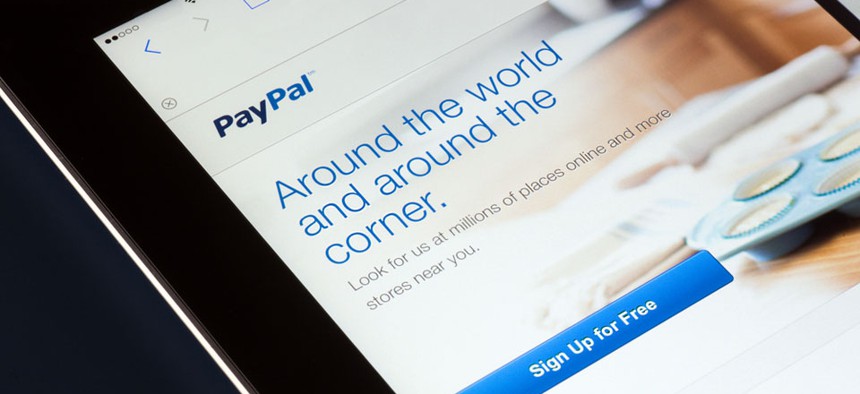Paying the Government Just Got a Whole Lot Easier

littleny/Shutterstock.com
Thanks to a newly unveiled partnership, the public can now make online payments using two popular digital wallet services, PayPal and Dwolla.
The next time you’re asked to fork over money for a court filing fee or your monthly Small Business Administration loan payment, you don’t need to reach for your checkbook.
No, you’ll still have to make the payment. But the process will likely be much simpler, thanks to a newly unveiled partnership between the Treasury Department and two popular digital wallet services, PayPal and Dwolla.
The partnership, announced in a Fiscal Service press release Wednesday, started as a pilot program on Pay.gov. It allows the public to make online payments with both PayPal and Dwolla, and represents another step the federal government has taken on its journey into the digital age.
As Pay.gov is a Web system for transactions between the public and federal agencies, the change will affect everything from court fees to National Endowment of the Arts donations.
“The goal of these partnerships is to expand the options customers have for transactions with the federal government, providing customers greater choice and a better customer experience,” the press release from the agency stated.
Although already popular digital payment methods, PayPal and Dwolla could see a noticeable rise in the money flowing through their systems thanks to the federal partnership.
Last fiscal year, Pay.gov was one of only a handful of programs responsible for processing 400 million transactions, equaling more than $3.5 trillion of revenue, according to the press release.
In contrast, PayPal processes some 11 million payments each day, while Dwolla only processes thousands of payments per day, according to the services' respective websites.
There's a good chance the public will embrace these digital payment methods for their transactions with the federal government, as both PayPal and Dwolla already have large followings. And of the trillions of dollars collected by the Fiscal Service last year, almost 98 percent of it was completed digitally.
Aside from the increase in simplicity that will likely come from making payments through these digital payment programs, PayPal and Dwolla have another element going for them. Neither of them releases an individuals' card numbers when they make payments, according to their websites.
Dwolla, for example, uses authentication and tokenization, according to Jordan Lampe, director of communications and policy affairs for Dwolla.
"This removes the taxpayers payment credentials from the transaction, eliminating the visibility and circulation of this sensitive data between the members of the network," Lampe said.
The Treasury’s partnership with PayPal and Dwolla will likely not be unique for long. The Fiscal Service's goal is to provide various digital payment options in an effort to move away from "paper-based transactions using services available in the private sector when possible,” according to the press release.
Various federal institutions are slated to begin accepting Apple Pay in September, according to Apple CEO Tim Cook, who spoke last week at the White House Summit on Cybersecurity and Consumer Protection.
There are also plans that Apple Pay will accept federal debit cards provided for such programs as Social Security as forms of payment on its own website.
But amid the plethora of cyber-attacks, will looping these third-party sites into Pay.gov create an added security risk?
Based on PayPal and Dwolla’s websites, the answer is an emphatic no.
While Dwolla says it protects its servers with 128-bit encryption, a firewall, along with other forms of safeguards, PayPal says it watches over the transactions moving through its site 24/7.
“Every transaction is heavily guarded behind our next-level encryption,” the PayPal website stated.
(Image via littleny / Shutterstock.com)
NEXT STORY: America Needs a New FOIA Overseer: Is it You?





